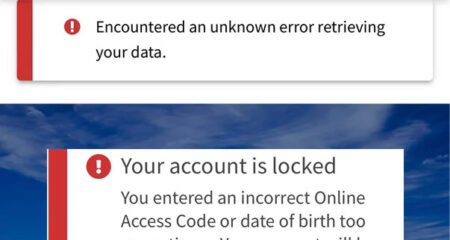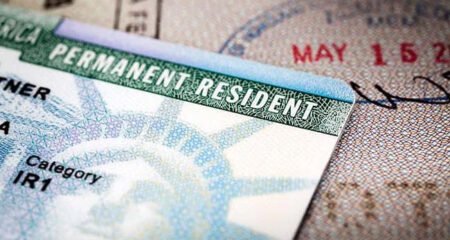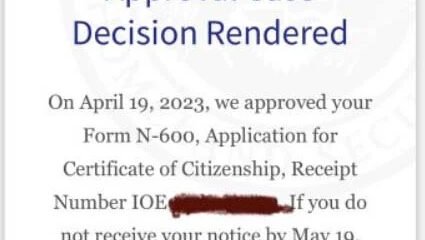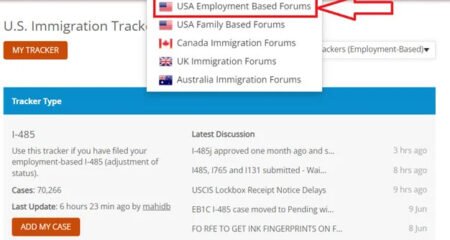A green card is a card that allows a person to live and work permanently in the United States. So, foreigners who want to live permanently in America need this green card. The United States seems to be a popular destination country for the world’s immigrants. By the way, which state is the easiest to get a green card in the US? Well, this article will explore some information related to green cards.
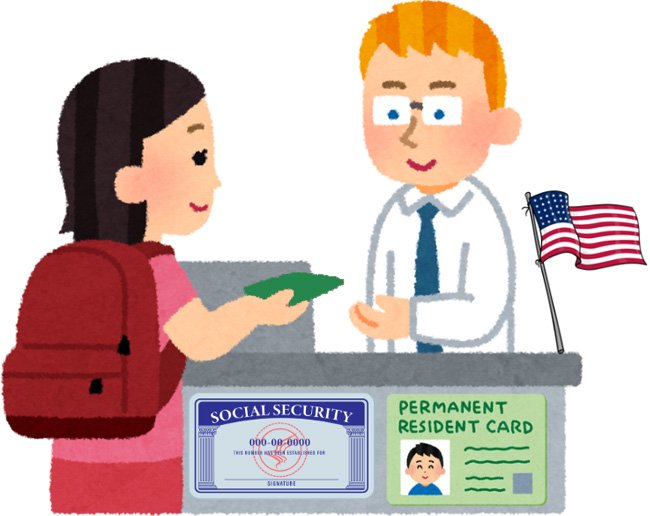
Understanding the Process of Green Card
With Green cards or officially called resident cards, immigrants have the right to live and work in the United States permanently. Therefore, if immigrants have decided to live permanently in the United States, getting a green card is a must. You should know that green cards can be obtained through various categories. Now, let us learn some of the ways or categories to get a green card.
1. Family-based Green Cards
A popular way to obtain a green card is through family sponsorship. Lawful permanent residents and US citizens have the right to sponsor their family members including spouses, parents, and aged children (under 21 who are unmarried) to immigrate to the US and obtain a green card. Apparently, many people get their green cards this way because of its faster processing time compared to other categories.
2. Employment-based Green Cards
As an immigrant, you can also get a green card through the Employment-based green card category. It offers the right to work and live permanently to professional, skilled workers and individuals with exceptional abilities. Most employment-based green card categories are determined by educational requirements and the level of difficulty of the job the foreign national will perform. These categories are also subject to various preferences and priorities that may affect processing times.
3. Diversity Visa Lottery
You may have heard of the Diversity Immigrant Visa program which is called the lottery for green cards. This is another way to get a green card for individuals from countries with low US immigration rates. For your information, the US immigration law provides 55,000 immigrant visa numbers for foreign nationals from countries that have a low number of permanent residency applications to the United States. If you meet all the requirements, then you can apply under the Diversity Immigrant Visa program. Every year, a number of applicants are randomly selected and given the opportunity to apply for a green card. Your chances of getting a green card through this means depend on your personal circumstances and luck.
Some Factors that Affect Processing Times
Here are some factors that may affect processing times:
- Visa category
Visa categories have different levels of demand and visa numbers.
- USCIS caseload
The high number of applications and varying USCIS caseloads affect the processing times.
- Countries that may be subject to fees
Certain countries have a higher demand for green cards. This leads to longer waiting times.
- Request for Evidence (RFE)
If USCIS needs additional evidence to substantiate the application, this can cause delays that will certainly affect the processing time if the information requested by USCIS is not provided promptly.
- Priority date
The priority date is the date on which the application was first filed, this date determines the applicant’s place in the queue.
- Visa bulletin
Each month, the US Department of State publishes a Visa Bulletin. This document explains the availability of immigrant visa numbers, which may affect the progress of certain applications.
Additionally, state-specific factors may also affect processing times. However, in this regard, USCIS always strives to maintain consistent national standards in processing green card applications. Differences between states are possible due to the complexity of the immigration system and the many variables at play.
Reasons for Varying Processing Times Across States
Each state has varying processing times due to the following reasons:
- Caseload and demand
States with higher numbers of immigrants or industries that rely heavily on foreign workers will experience increased demand for green cards. This results in USCIS field offices in these states having a higher caseload which leads to longer processing times than other states.
- USCIS Field Office Resources
Countries with better staffed and funded USCIS field offices usually have a higher capacity to process applications efficiently, resulting in shorter processing times.
- Immigration court arrears
Countries that have a lot of delays in immigration court cases can indirectly affect green card processing time. USCIS will put certain cases on hold pending the outcome of the court.
- Regional policies
USCIS regional offices have flexibility in managing caseloads based on local priorities or economic considerations.
- Proximity to USCIS Service Centers
Some states are close to USCIS service centers, making application processing faster.
Which State is Easiest and Fastest to Get a Green Card in the US?
As we already explained, Green card processing time can differ in each state as determined by the USCIS. It largely depends on several factors such as country of origin, eligibility category, and specific circumstances. Now you might be curious about which state has the fastest Green Card processing time? Or, which state is the easiest to get a Green Card in the US? Unfortunately, there is no source of information that mentions exactly which state is easiest and fastest to get a Green Card in the US. For this, we will continue to try to dig up this information deeper.
Usually, states with faster processing times are those with efficiently managed and well-funded USCIS field offices. In addition, states with a smaller number of immigrants and a lower number of applications can also potentially have faster green card processing times. Whereas states with potentially slower processing times are usually those with high immigrant populations and those with many delays in immigration matters.
The Main Factors Contributing to Delays
The presence of a pandemic or other unforeseen events has an impact on processing times. However, the impact of pandemics and unforeseen events on processing times is not the same in all states. Some states experience less significant delays, while others experience more severe delays. Here are some of the main factors that contribute to this delay:
- USCIS Office Closures and limited capacity
During the pandemic, USCIS field offices and Application Support Centers are temporarily closed or operated at reduced capacity, to safeguard employee and public health. These USCIS Office closures caused the suspension of in-person interviews and biometric appointments resulting in delays and impacting processing times.
- Shifting to remote work arrangements
This shift to remote work arrangements poses challenges for USCIS staff members. With the rule, staffing has decreased and communication has become difficult. It is no wonder that green card processing time has been hampered.
- Backlog accumulation
During the pandemic, the suspension of certain services resulted in a buildup of application backlogs. As the pandemic continued, the application backlog increased, affecting green card processing time.
- Travel restrictions and consular closures
Applicants outside the US experience challenges and difficulties attending interviews. In addition, applicants outside the US also have difficulty obtaining an immigrant visa number.
- Prioritization of emergency services
USCIS is prioritizing emergency services, such as humanitarian and medical-related applications. This re-prioritization has a significant impact on the processing of green card applications.
- Digital transformation and remote services
USCIS is accelerating its digital transformation efforts by offering more remote services. The implementation of this process has certainly affected the processing time. Meanwhile, the impact of the new process varies from state to state.
- State-level variations
For countries with higher infection rates, they are bound to face greater and more significant disruptions in USCIS operations than countries with lower infection rates.
Tips for Green Card Applicants
Obtaining a green card can be tricky if you don’t know the tips. Therefore, you should know the tips to increase your chances of becoming a green card holder, no matter which state you live in. Here are some tips for green card applicants to make getting a green card easier.
- Research the green card application process
If you want to become a green card holder, start by learning and researching the green card application process thoroughly. Understand the different categories, requirements, and forms needed to get a green card. By understanding the green card application process, you will know what documents you need to prepare. Of course, this will also help you avoid delays.
- Choose the right category
You should choose the most appropriate green card category based on your eligibility and circumstances. Do not choose the wrong category or you will face difficulties. Make sure you meet the criteria for that specific category, whether you are applying through family sponsorship, employment-based immigrant visa, or Diversity Immigrant Visa program.
- Be accurate and thorough
Make sure you complete your application form thoroughly and accurately. Remember that mistakes can lead to delays. Even worse, it may lead to your green card application being rejected. Therefore, you should double-check all the information. If there is anything you are unsure about, you can seek help or guidance from a trusted source such as an immigration lawyer.
- Collect strong supporting evidence
To strengthen your case, you must provide adequate supporting documentation including birth certificates, employment records, marriage certificates, and other relevant evidence to verify your eligibility.
- Stay organized
You should keep all the documents related to your green card application organized. That way, you will be able to respond to any requests from the USCIS responsively. Besides, you will also avoid mistakes in storing important documents.
- Pay attention to the submission fee
You must submit the correct green card filing fee with your application. Remember that the green card filing fee may change over time. Therefore, you should check the latest fees on the USCIS website.
- Timely response
Make sure you always respond to any communication from USCIS promptly. If USCIS requests additional information or evidence, then you provide it immediately to avoid delays in processing.
- Consider premium processing
For eligible employment-based green card applications, you may have the option to expedite processing through the USCIS Premium Processing service. If yes, then you can consider this USCIS Premium Processing service in order to speed up the adjudication process.
- Stay informed
Make sure you stay up to date with immigration policies and any changes that may affect your green card application. For your information, USCIS frequently updates its procedures. Therefore, you must stay informed so that you can adjust your strategy.
- Be patient
As we know, Green card processing time may vary from state to state. And, delays often occur. In this case, you must remain patient during the green card application process. Immediately follow up on the status of your application if necessary.
- Seek legal help
If you experience difficulties when applying for a green card, then you can contact a reliable and experienced immigration lawyer. They will try to solve your case and provide useful suggestions so that you can quickly become a green card holder.
Conclusion
There are some categories you can choose to get a Green Card; Family-based Green Cards, Employment-based green cards, and Diversity Immigrant Visa program. Family-based visas offer a faster path to a green card, usually within 1-2 years. The Diversity Immigrant Visa Program also offers the fastest way to get a green card, but it is based on luck. The green card process in each state varies depending on several factors. There is no information that states exactly which states in the US are easiest and fastest to get a green card. However, usually, states that are quicker to grant green card processing are states that have well-funded and efficiently managed USCIS field offices. Additionally, states with fewer applications also have faster green card processing times. You can seek the help of an experienced immigration attorney to avoid any mistakes that lead to delays or even denials, thereby speeding up your path to obtaining a green card.
AUTHOR BIO
On my daily job, I am a software engineer, programmer & computer technician. My passion is assembling PC hardware, studying Operating System and all things related to computers technology. I also love to make short films for YouTube as a producer. More at about me…
